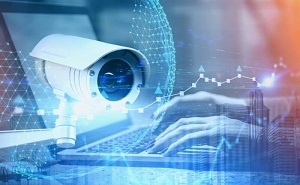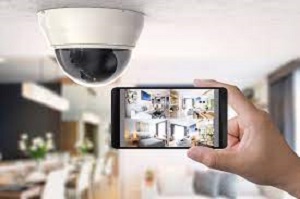The rapid development of the current artificial intelligence technology is actively promoting the security field towards a more intelligent and more humane direction, which is mainly reflected in the following aspects:
1. smart security--application in the public security industry
The urgent need of users in the public security industry is to find clues of criminal suspects in the massive video information. Artificial intelligence has natural advantages in feature extraction and content understanding of video content. The front-end camera has a built-in artificial intelligence chip, which can analyze the video content in real-time, detect moving objects, identify the attribute information of people and vehicles, and transmit it to the central database of the back-end artificial intelligence through the network for storage. Collected massive city-level information, and then using powerful computing power and intelligent analysis capabilities, artificial intelligence can analyze the suspect's information in real-time, give the most likely clues and suggestions, and lock the suspect's trajectory from the original few days. , shortened to a few minutes, saving valuable time for the detection of the case. With its powerful interactive capabilities, it can also communicate with the police in natural language, making it truly an expert assistant for case investigators.
Taking vehicle characteristics as an example, vehicle tracking can be performed by using a small electric fan in front of the driving seat of the vehicle, and the passage track of the suspected vehicle involved in the case can be locked in the massive video resources.

2. smart security- application in the transportation industry
In the field of transportation, with the large-scale networking of traffic checkpoints, the collection of massive vehicle traffic records plays an important role in urban traffic management. Using artificial intelligence technology, urban traffic flow can be analyzed in real-time, the interval between traffic lights can be adjusted, and the waiting time of vehicles can be shortened. time and improve the traffic efficiency of urban roads. The city-level artificial intelligence brain grasps the trajectory information of vehicles passing on the city road, the vehicle information of the parking lot, and the parking information of the community in real-time. It can predict the changes in traffic flow and the number of parking spaces half an hour in advance and allocate resources reasonably Drain traffic, realize large-scale traffic linkage scheduling at airports, railway stations, bus stations, and business districts, improve the operation efficiency of the entire city, and provide guarantees for the smooth travel of residents.
3. smart security- application in intelligent buildings
In the field of intelligent buildings, artificial intelligence is the brain of the building, which comprehensively controls the security and energy consumption of the building. Make the operation efficiency of the building optimal and prolong the service life of the building. The artificial intelligence core of the smart building aggregates the monitoring information and card-swiping records of the entire building. The indoor camera can clearly capture the personnel information. When swiping the card at the access control, it compares the access card information and the face information of the swiping person in real-time, and detects the fraudulent card swiping behavior. It can also distinguish the movement trajectory and stay time of staff in the building, find illegal visiting behavior, and ensure the safety of the core area.
4. smart security - application in the factory park
Industrial robots have a long history, but most of them are operational robots that are fixed on the production line. Mobile line inspection robots will have broad application prospects in fully enclosed unmanned factories. In the factory campus, security cameras are mainly deployed at the entrances, exits, and perimeters, and cannot be involved in the internal corners and corners, and these places are precisely the dead ends of potential safety hazards. Use mobile patrol robots to regularly patrol and read instruments. Values, analyze potential risks and ensure the reliable operation of fully enclosed unmanned factories.
5. smart security - application in civil security
In the field of civil security, each user is highly personalized, using the powerful computing and service capabilities of artificial intelligence to provide differentiated services for each user, enhance the sense of security of individual users, and indeed meet people's growing demands. service requirements. Taking home security as an example, when it is detected that there is no person in the home, the home security camera can automatically enter the arming mode. And when family members go home, they can automatically disarm to protect user privacy. During the night, through self-learning for a certain period of time, master the work and rest rules of family members, activate the defense when the owner is resting, ensure night safety, save the trouble of manual defense, and truly realize humanization.

Problems with smart security
The application of artificial intelligence in the field of security has very good prospects, but the current foundation is still weak, and there are still many problems in the application process that need to be improved and solved:
1. The video imaging quality is greatly affected by the environment, and there are problems such as insufficient illumination, blurred images, too small target size, or mutual occlusion, which is not conducive to the recognition of video content by artificial intelligence.
2. Data resources are scattered, the degree of openness and sharing is low, and it is difficult to carry out multi-dimensional data fusion analysis, which makes artificial intelligence lack effective data support.
3. The accumulation of domain expertise is insufficient. The early intelligent analysis technology belongs to the target detection and behavior analysis of a single scene. The ability to understand video content is weak, and it rarely involves the analysis of related behaviors in a wide range of scenes. There is no accumulated effective experience and knowledge for abnormal analysis and risk analysis. predict.
4. Lack of effective self-improvement ability. A lot of current intelligence is just reactive intelligence that makes automatic judgments based on input conditions and does not have the ability to grow. Artificial intelligence should have time-based experience accumulation and the ability to share experience among groups in order to continuously improve and make intelligent capabilities stronger and more efficient.
In the future development and challenges in the field of artificial intelligence security, there are still many obstacles and difficulties that need to be overcome and overcome, but we must always look at the field of security with an optimistic heart, and firmly believe that it will become a good assistant for intelligence in our lives, promoting The level of intelligence in the security field.
You May Also Like:Smart Security Solutions Image Recognition--Key Application Fields of Artificial Intelligence
A brief introduction to artificial intelligence algorithms?











